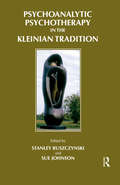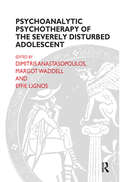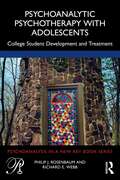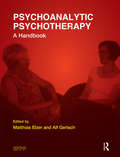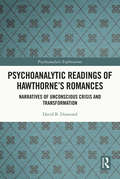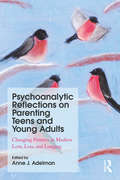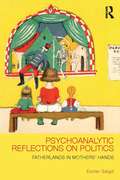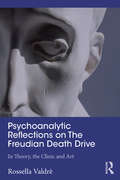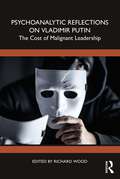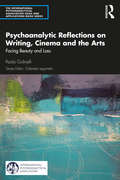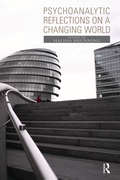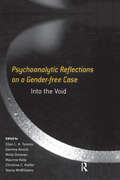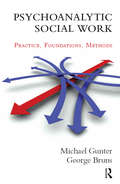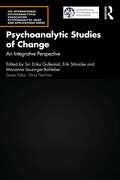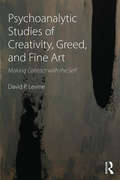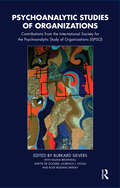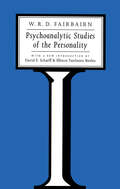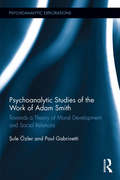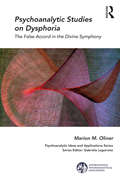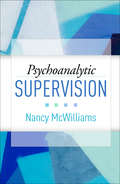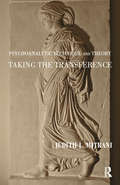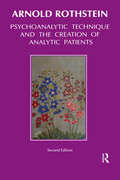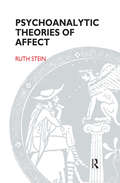- Table View
- List View
Psychoanalytic Psychotherapy in the Kleinian Tradition
by Sue Johnson Stanley RuszczynskiThis set of papers, from members of the British Association of Psychotherapists, demonstrates the vitality of the 'Kleinian tradition' in work with adult patients. It is a picture of work from outside the inner circle of Kleinians in London. And it thus indicates how the concepts have fared in their transport into everyday psychotherapy.
Psychoanalytic Psychotherapy of the Severely Disturbed Adolescent (The\efpp Monograph Ser.)
by Margot Waddell Dimitris Anastasopoulos Effie Laylou-LignosWith chapters written by psychoanalytic psychotherapists from across Europe, and from different analytic traditions, this book shows the common thread that weaves through these different traditions and the serious challenges facing psychotherapists dealing with the future adult generations of Europe.
Psychoanalytic Psychotherapy with Adolescents: College student development and treatment (Psychoanalysis in a New Key Book Series)
by Philip J. Rosenbaum Richard E. WebbIn this book, Philip Rosenbaum and Richard Webb consider the complexities of working as counselors and psychotherapists for college students, and offer a broad and detailed account of the developmental issues essential to understanding adolescent experience. Drawing on existentialism, cultural psychology and relational and object relations theories in psychoanalysis, this book offers a perspective that is sensitive to both clinical concerns and the broader context of college counseling and working with adolescents. Particular attention is paid to the emergence of adolescent identities through a relationship with "otherness," and several considerations are explored as a result. These include the emergence and reconciliation of destructive feelings, suicidal phenomenology and the effects of trauma. By taking a fresh look at clinical developmental theories as they affect adolescents and young adults, Rosenbaum and Webb provide a view of college-student development that is theoretically rich and clinically applicable in a way that warrants renewed appreciation and practice among counselors, psychotherapists and psychoanalysts work with college-age clients.
Psychoanalytic Psychotherapy: A Handbook (The\efpp Monograph Ser.)
by Matthias Elzer Alf GerlachThis book provides a complete and fundamental overview, from a psychoanalytical point of view, on theoretical and clinical aspects of psychodynamic or psychoanalytic psychotherapy. It includes the theory of the human mind, psychic development, psychic conflicts, trauma, and dreams.
Psychoanalytic Readings of Hawthorne’s Romances: Narratives of Unconscious Crisis and Transformation (Psychoanalytic Explorations)
by David B. DiamondOffering innovative, psychoanalytic readings of Nathaniel Hawthorne’s four romances, this volume systematically applies Freudian theory to present significant new insights into the psychology of Hawthorne’s characters and their fates. By critically examining scenes in which the protagonists confront past traumas, Diamond underscores the transformative potential which Hawthorne attributes to encounters with the unconscious. Psychoanalytic narrative technique is employed to interpret the psychogical crises, all hidden by Hawthorne in narrative gaps, in The Scarlet Letter, The House of the Seven Gables, The Blithedale Romance, and The Marble Faun. The protagonists' transformations that are illuminated are crucial to an understanding of the trajectory and resolution of the romances. The text will benefit both academic and non-academic readers who seek a deeper understanding of the psychology of Hawthorne's romances. It will be of particular interest to educators and researchers of applied psychoanalysis and psychoanalytic technique. Since its conclusions challenge many currently held critical views, this volume is especially relevant to scholars of Hawthorne studies, interdisciplinary literary studies, and 19th century American literature.
Psychoanalytic Reflections on Parenting Teens and Young Adults: Changing Patterns in Modern Love, Loss, and Longing
by Anne J. AdelmanPsychoanalytic Reflections on Parenting Teens and Young Adults explores the rich, multi-layered parent-child interactions that unfold during the period of separation and launching. While this is a necessary transitional time, parents inevitably experience feelings of loss and longing for the past as well as hope for the future. <P><P> With honesty, humor, and originality, the book brings together the voices of psychoanalysts, speaking frankly, and not just as professionals, but also as parents grappling with raising young adults in today’s fast-paced world. The contributors reflect on the joys, regrets, and surprises as well as the challenges and triumphs they experience as their children reach the threshold of young adulthood. They address a wide range of topics relevant to parents and practitioners alike-indeed to all those who are closely involved with the growth and maturation of today’s youth. Offering both a broad perspective and an intimate look at present-day parenting dilemmas, the chapters focus on five main areas of interest: raising youth in the digital age, developmental difficulties, evolving gender norms, social concerns and, finally, the building of resiliency. <P><P> Psychoanalytic Reflections on Parenting Teens and Young Adults offers an alternative lens to consider the complex challenges parents face in raising today’s teens and young adults, replacing the customary notion of "failure to launch" with the concept of "holding on with open arms." The explorations in this book advance the idea that in the end, these struggles are essential for growth, buoyancy and wisdom. It will appeal greatly to psychoanalysts and psychoanalytic psychotherapists, as well as family therapists.
Psychoanalytic Reflections on Politics: Fatherlands in mothers' hands
by Eszter SalgóPsychoanalytic Reflections on Politics: Fatherlands in mothers’ hands is a playful exploration of how people’s desires, fantasies, and emotions shape political events and social phenomena. It highlights the mythical sources of today’s political projects, the power of political imagination, and the function of symbolism in political thought. Eszter Salgó argues that the driving force for the formation of political communities is fantasy – ‘illusions’ in a Winnicottian sense, ‘phantasies’ in a Lacanian sense, ‘phantoms’ as described by Nicolas Abraham and Maria Torok, and ‘dreams’ as interpreted by Sándor Ferenczi. She introduces the metaphor of the ‘fantastic family’ as a symbolic representation of political communities, both to reflect on people’s deeply felt desire to find in public life the resolution, love, and wholeness of early childhood, and to unveil the political elite’s readiness to don the mask of the ‘ideal parent’. The book is divided into two parts. The first part of the book explores the theories of Donald Winnicott and Jacques Lacan: the matrimony on the stage of politics between the ‘good-enough mother’ and the Symbolic Father which inaugurates the story of democracy’s ‘fantastic family’. The second part presents the ‘fantastic families’ of selected countries such as Hungary, Italy, and the world community to explain the proliferation of cosmogony projects, and to document the failure of the political elites to offer a satisfactory performance of their maternal and paternal functions. Psychoanalytic Reflections on Politics: Fatherlands in mothers’ hands presents a new way of considering the art of politics, based on the understanding that people perceive reality through imagination and unconscious fantasy. It will be of interest to psychoanalysts, and academics from across the disciplines of politics, psychology, anthropology, sociology, philosophy, literature, and art.
Psychoanalytic Reflections on The Freudian Death Drive: In Theory, the Clinic, and Art
by Rossella ValdrèPsychoanalytic Reflections on The Freudian Death Drive is a highly accessible book that investigates the relevance, complexity and originality of a hugely controversial Freudian concept which, the author argues, continues to exert enormous influence on modernity and plays an often-imperceptible role in the violence and so-called "sad passions" of contemporary society. With examples from cinema, literature and the consulting room, the book’s four chapters – theory, the clinic, art and contemporaneity – investigate every angle, usually little explored, of the death drive: its "positive" functions, such as its contribution to subjectification; its ambiguous relationship with sublimation; the clues it provides about transgenerational matters; and its effects on the feminine. This is not a book about aggression, a type of extroflection of the death drive made visible, studied and striking; rather, it is about the derivatives of the pulsion that changes in the clinic, in life, in society, in artistic forms. With bold and innovative concepts and by making connections to film and books, Rossella Valdrè unequivocally argues that the contemporary clinic is a clinic of the death drive. Psychoanalytic Reflections on The Freudian Death Drive seeks to relaunch the debate on a controversial and neglected concept and will appeal to psychoanalysts and psychoanalytic psychotherapists. Today’s renewed interest in the Freudian death drive attests to its extraordinary ability to explain both "new" pathologies and socio-economic phenomena.
Psychoanalytic Reflections on Vladimir Putin: The Cost of Malignant Leadership
by Richard WoodPsychoanalytic Reflections on Vladimir Putin: The Cost of Malignant Leadership attempts to explore the core psychodynamics that appear to characterize Vladimir Putin’s presidency.Its contributors examine the nature of the leader-follower relationship, the costs of malignant leadership, and the larger historical context in which Putin’s presidency is unfolding. The sobering threat of nuclear war is considered. Finally, the viability and ethics of distance assessment are discussed.This book will be of great interest to psychoanalysts and to readers seeking to understand the complex dynamics of populist leadership.
Psychoanalytic Reflections on Writing, Cinema and the Arts: Facing Beauty and Loss (The International Psychoanalytical Association Psychoanalytic Ideas and Applications Series)
by Paola Golinelli"Why are we so fascinated by beauty?" is a question many of us have asked ourselves, as have many who came before us. This book investigates the moment of ecstatic solitude in which everyone can experience emotions through films, works of art or natural phenomenon, when, even if for a "magic" instant, we feel "alive" and masters of our own Self. Expanding from the author’s personal experience, this book is a series of applied psychoanalytic essays on film, literature, and aesthetic pleasure. It explores the complexity of loss and mourning, destructivity, perversion, and revenge, as well as an exploration of what can facilitate transformation and how to lead a blocked healing process back to motion. This fascinating and insightful book will be of interest to psychoanalysts, psychologists, teachers and students, and all those with an interest in psychoanalysis and the arts.
Psychoanalytic Reflections on a Changing World
by Halina BrunningThis book analyses a range of ubiquitous phenomena that make up our daily lives and to ask, not so much whether psychoanalytic thinking can add to our existing understanding of these phenomena, but what it can add. It deals with work issues independently of each other.
Psychoanalytic Reflections on a Gender-free Case: Into the Void
by Nancy McWilliams Christine C. Kieffer Ellen L. K. Toronto Gemma Ainslie Molly Donovan Maurine KellyThe past two decades of psychoanalytic discourse have witnessed a marked transformation in the way we think about women and gender. The assignment of gender carries with it a host of assumptions, yet without it we can feel lost in a void, unmoored from the world of rationality, stability and meaning. The feminist analytic thinkers whose work is collected here confront the meaning established by the assignment of gender and the uncertainty created by its absence. The contributions brought together in Psychoanalytic Reflections on a Gender-free Case address a cross-section of significant issues that have both chronicled and facilitated the changes in feminist psychoanalysis since the mid 1980s. Difficult issues which have previously been ignored (such as the pregnancy of the therapist or sexual abuse regarded as more than a fantasy) are considered first. The book goes on to address family perspectives as they interact and shape the child’s experience of growing up male or female. Other topics covered are the authority of personal agency as influenced by the language and theory of patriarchy, male-centred concepts that consistently define women as inferior, and the concept of gender as being co-constructed within a relationship. The gender-free case presented here will fascinate all psychoanalysts interested in exploring ways of grappling with the elusive nature of gender, as well as those studying gender studies.
Psychoanalytic Reflections on a Gender-free Case: Into the Void
by Nancy McWilliams Christine C. Kieffer Ellen L. K. Toronto Gemma Ainslie Molly Donovan Maurine KellyThe past two decades of psychoanalytic discourse have witnessed a marked transformation in the way we think about women and gender. The assignment of gender carries with it a host of assumptions, yet without it we can feel lost in a void, unmoored from the world of rationality, stability and meaning. The feminist analytic thinkers whose work is collected here confront the meaning established by the assignment of gender and the uncertainty created by its absence. The contributions brought together in Psychoanalytic Reflections on a Gender-free Case address a cross-section of significant issues that have both chronicled and facilitated the changes in feminist psychoanalysis since the mid 1980s. Difficult issues which have previously been ignored (such as the pregnancy of the therapist or sexual abuse regarded as more than a fantasy) are considered first. The book goes on to address family perspectives as they interact and shape the child’s experience of growing up male or female. Other topics covered are the authority of personal agency as influenced by the language and theory of patriarchy, male-centred concepts that consistently define women as inferior, and the concept of gender as being co-constructed within a relationship. The gender-free case presented here will fascinate all psychoanalysts interested in exploring ways of grappling with the elusive nature of gender, as well as those studying gender studies.
Psychoanalytic Social Work: Practice, Foundations, Methods
by Michael Gunter George BrunsThis book represents the first systematic account of the theory and practice of psychoanalytical social work. For students and those entering the field of social work who are interested in psychoanalytical social work it offers an overview of the diverse fields of practice of psychoanalytical social work and combines this with a description of its history, relation to other areas of social work and relevant psychoanalytical theories. The authors are convinced for this reason that both for students on degree courses as also for social workers and social education workers in further training the book offers an important contribution and fills a gap in this field. Equally, it addresses practising social workers, social educationalists, psychiatrists or psychotherapists offering comprehensive insight into this particular form of social work for those working in centres for counselling or early intervention or in social paediatrics.
Psychoanalytic Studies of Change: An Integrative Perspective (The International Psychoanalytical Association Psychoanalytic Ideas and Applications Series)
by Marianne Leuzinger-Bohleber Erik StänickePsychoanalytic Studies of Change presents recent studies of the process and outcome of psychoanalytic therapy with an integrative perspective.A recurrent challenge in the discussion of therapeutic outcome is the gap between empirical, quantitative studies, reporting results on a group level, and the clinician’s interest in complex mechanisms of change presupposing microanalysis of dynamic interaction processes. This book bridges that gap via dynamic contributions from a variety of authors. Quantitative and qualitative studies are connected, epistemological and conceptual research is emphasized as specific domains, and in-depth clinical case studies are highlighted. The book comprises several new contributions to epistemology and conceptual research, as well as chapters discussing the challenge of combining qualitative and quantitative methods in studying process and outcome.Psychoanalytic Studies of Change will not only meet a need specifically within psychoanalysis for up-to-date research but also provide an overview of the latest empirical research on psychoanalysis for a broader clinical and academic group of readers. It will appeal to psychoanalysts in practice and in training.
Psychoanalytic Studies of Creativity, Greed, and Fine Art: Making Contact with the Self
by David P LevineThroughout the history of psychoanalysis, the study of creativity and fine art has been a special concern. Psychoanalytic Studies of Creativity, Greed and Fine Art: Making Contact with the Self makes a distinct contribution to the psychoanalytic study of art by focusing attention on the relationship between creativity and greed. This book also focuses attention on factors in the personality that block creativity, and examines the matter of the self and its ability to be present and exist as the essential element in creativity. Using examples primarily from visual art David Levine explores the subjects of creativity, empathy, interpretation and thinking through a series of case studies of artists, including Robert Irwin, Ad Reinhardt, Susan Burnstine, and Mark Rothko. Psychoanalytic Studies of Creativity, Greed and Fine Art explores the highly ambivalent attitude of artists toward making their presence known, an ambivalence that is evident in their hostility toward interpretation as a way of knowing. This is discussed with special reference to Susan Sontag's essay on the subject of interpretation. Psychoanalytic Studies of Creativity, Greed and Fine Art contributes to a long tradition of psychoanalytically influenced writing on creativity including the work of Deri, Kohut, Meltzer, Miller and Winnicott among others. It will be of interest to psychoanalysts, psychoanalytic psychotherapists, historians and theorists of art.
Psychoanalytic Studies of Organizations: Contributions from the International Society for the Psychoanalytic Study of Organizations (ISPSO)
by Burkard SieversThis book samples the groundbreaking work that has been developed over the last twenty-five years by psychoanalysts, writers and practitioners associated with the International Society for the Psychoanalytic Study of Organizations (ISPSO). What characterises this collection of original papers is an attempt to look at organizations, groups, teams and organizational role holders using psychoanalytic, systemic and psychodynamic perspectives that collectively eschew superficial, linear, prescriptive and mechanistic views of both the system and the individual within. These papers, delivered as presentations to the Society during the Annual Symposia of the ISPSO from its inception in 1983 to date, collectively form an important commentary on the changing societal dynamics and current preoccupations facing contemporary organizations, their leaders and their workforce. As such, these papers are representative of many that have contributed to, and documented, the development of the thought and praxis from a psychoanalytic perspective and systems thinking over the last quarter of century. Whilst most of these papers have already been published elsewhere, the ISPSO as an organization wished to include them in this volume, recognising their lasting influence and legacy as well as their ongoing impact upon the thinking and the practice of its membership and beyond.
Psychoanalytic Studies of the Personality
by W. R. FairbairnFirst published in 1952, W.R.D. Fairbairn's Psychoanalytic Studies of the Personality re-oriented psychoanalysis by centering human development on the infant's innate need for relationships, describing the process of splitting and the internal dynamic relationship between ego and object. His elegant theory is still a vital framework of psychoanalytic theory and practice, infant research, group relations and family therapy.This classic collection of papers, available for the first time in paperback, has a new introduction by David Scharff and Elinor Fairbairn Birtles which sets Fairbairn's highly original work in context, provides an overview of object relations theory, and traces modern developments, launched by Fairbairn's discoveries.
Psychoanalytic Studies of the Work of Adam Smith: Towards a Theory of Moral Development and Social Relations (Psychoanalytic Explorations)
by Sule Ozler Paul A GabrinettiPsychoanalytic Studies of the Work of Adam Smith blends the rich intellectual heritage of the hermeneutic tradition with the methods and concepts of psychoanalysis, in order to examine the seminal works of Adam Smith. This is the first book on Smith to analyse the works of the groundbreaking moral theorist and founding father of economics from a psychoanalytic perspective, whilst also examining the human capacities and skills that are necessary to put Smith’s ideas into practice. <P><P>Starting with a detailed discussion of the psychological difficulties that afflicted Smith, Özler and Gabrinetti examine the influence that Smith’s life had on the ideas that are found in his major works. The authors explore the sympathetic process in Smith’s The Theory of Moral Sentiments (TMS) from an intersubjectivist perspective and use ideas from developmental psychology to argue that sympathy leads to morality. This book contains a thorough analysis of the defences that are used to create Smith’s moral system in the TMS and explores how Smith’s ideas were precursors to concepts later developed by Freud. The authors show that Smith’s attitude to women was at best ambivalent and consider the reciprocal interaction between markets and morality from an evolutionary psychology perspective. <P><P>Covering an impressive range of topics, this book will appeal to academics and postgraduate students with an interest in psychoanalysis, moral philosophy, history of thought and the social sciences. The book should also be of interest to more advanced undergraduate students.
Psychoanalytic Studies on Dysphoria: The False Accord in the Divine Symphony (The International Psychoanalytical Association Psychoanalytic Ideas and Applications Series)
by Marion M. OlinerPsychoanalytic Studies on Dysphoria: The False Accord in the Divine Symphony depicts the profound dysphoria afflicting certain individuals, and includes the author's own personal experience of this as a German Jewish child during the Holocaust. Marion M. Oliner explores the impact of catastrophic events on the lives of individuals and their descendants from a broadly psychoanalytic perspective. The book focuses on the interplay between the experience and the unconscious meaning attributed to the trauma, and the ways in which patients may feel guilt, and blame themselves for the events and effects of their trauma. Drawing on the work of Freud and Winnicott, and with emphasis on the traumas suffered during the Second World War, Oliner offers new ways of understanding how resistant to treatment such traumas can be, and how the analyst can understand the experiences. The chapters span the evolution undergone in the nearly four decades of practice by the author. The book references a range of works including some taken from the German and French psychoanalytic literature, some never published in English. Taken together they aim at keeping the vitality of psychoanalysis without idealization, while discarding concepts whose essence is static, and therefore unhelpful. Psychoanalytic Studies on Dysphoria will appeal to psychoanalysts as well as other mental health professionals working with self-defeating behavior as a result of trauma.
Psychoanalytic Supervision
by Nancy McWilliamsDrawing on deep reserves of experience and theoretical and research knowledge, Nancy McWilliams presents a fresh perspective on psychodynamic supervision in this highly instructive work. McWilliams examines the role of the supervisor in developing the therapist's clinical skills, giving support, helping to formulate and monitor treatment goals, and providing input on ethical dilemmas. Filled with candid clinical examples, the book addresses both individual and group supervision. Special attention is given to navigating personality dynamics, power imbalances, and various dimensions of diversity in the supervisory dyad. McWilliams guides mentors and mentees alike to optimize this unique relationship as a resource for lifelong professional learning and growth.
Psychoanalytic Technique and Theory: Taking the Transference
by Judith L. MitraniThis volume consists of a series of essays inspired by Freud's paper on Jensen's novel Gradiva - "she who steps along." In the story a young archaeologist, Norbert Hanold, suffers from delusions but is able to unravel the mysteries of his emotional life and mind with the aid of a woman who does not challenge these delusions, but rather "steps along" with Hanold, gradually helping him to disentangle truth from fantasy, through what Freud called "cure by love". Gradiva, originally felt to be the source of Hanold's malady, eventually becomes the agent of its resolution and of his return to health. This extraordinary tale formed the basis for the author's concept of "taking the transference". Through clinical vignettes, various aspects of psychoanalytic technique - useful from the first encounter between patient and analyst and throughout the process of the development of mind to termination - are illustrated in detail.
Psychoanalytic Technique and the Creation of Analytic Patients
by Arnold RothsteinThis is a book on a neglected aspect of psychoanalytic technique that should be read by everyone who hopes to develop a psychoanalytic practice. The author's emphasis on the value of analyzing a prospective patient's motives for avoiding analysis is of utmost importance. An excellent book by a seasoned and gifted analyst.'- Charles Brenner, MD'Psychoanalytic Technique and the Creation of Analytic Patients is clear, practical, and above all courageous. On the central issues from the idea of analyzability, to the objectivity of diagnosis, to attitudes toward fees, Rothstein challenges received wisdom and skewers sacred cows. The result is a book that will help all clinicians - therapist and analyst alike - to work more effectively within the realities of contemporary practice. The author forces us to re-examine many fundamental assumptions, thereby contributing to radical re-evaluation of the nature of the psychoanalytic process itself.' - Jay Greenberg, PhD'In Psychoanalytic Technique and The Creation of Analytic Patients, a successful practicing analyst shares with us many of the secrets of his success.
Psychoanalytic Theories of Affect
by Ruth SteinThis book collates and clarifies psychoanalytic theories on affect, and how they relate to the clinical process. The author outlines and analyses the most important theories on affect, and examines empirical work presented over the past 100 years, exposing the rigidity of some existing notions.
Psychoanalytic Theories of Development: An Integration
by Phyllis Tyson Robert L. TysonThorough review of psychological development starting at infancy going through adulthood with emphasis on major developmental milestones.
